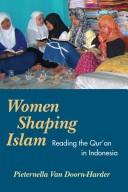| Listing 1 - 4 of 4 |
Sort by
|

ISBN: 1283044137 9786613044136 0252092716 9780252092718 9780252030772 025203077X 9780252073175 0252073177 9781283044134 Year: 2006 Publisher: Urbana
Abstract | Keywords | Export | Availability | Bookmark
 Loading...
Loading...Choose an application
- Reference Manager
- EndNote
- RefWorks (Direct export to RefWorks)
Women --- Women in Islam --- Women and religion --- Islam --- Human females --- Wimmin --- Woman --- Womon --- Womyn --- Females --- Human beings --- Femininity --- Religion and women --- Women in religion --- Religion --- Sexism in religion --- Mohammedanism --- Muhammadanism --- Muslimism --- Mussulmanism --- Religions --- Muslims --- Religious life --- Sociology of minorities --- Community organization --- Indonesia --- Women's organizations --- Book --- Empowerment
Book
ISBN: 1611177855 9781611177855 9781611177848 Year: 2017 Publisher: Columbia, South Carolina
Abstract | Keywords | Export | Availability | Bookmark
 Loading...
Loading...Choose an application
- Reference Manager
- EndNote
- RefWorks (Direct export to RefWorks)
A comprehensive examination of this deeply traditional Christian religion as it confronts modernity.
Copts. --- Copts --- Egyptians --- Ethnology --- Coptic Church. --- Church of Egypt --- Alexandria (Egypt : Coptic Patriarchate) --- Coptic Patriarchate of Alexandria --- Coptic Orthodox Patriarchate of Alexandria --- Baṭriyarkīyat al-Aqbāṭ al-Urthūdhuks --- Coptic Orthodox Church --- Kanīsah al-Qibṭīyah al-Urthūdhuksīyah --- Kanīsah al-Masīḥīyah bi-Miṣr --- Kanīsah al-Qibṭīyah --- Koptische Kirche --- الكنيسة القبطية --- كنيسة الاقباط الأرثوذكس --- كنيسة القبطية --- كنيسة القبطية الارثوذكسية --- Religious minorities
Book
ISBN: 940120537X 1435615476 9781435615472 9042023376 9789042023376 9789042023376 9042023376 9789401205375 Year: 2008 Publisher: Amsterdam New York, NY Rodopi
Abstract | Keywords | Export | Availability | Bookmark
 Loading...
Loading...Choose an application
- Reference Manager
- EndNote
- RefWorks (Direct export to RefWorks)
The various Christian, Muslim, traditional (African), and secular (Western) ways of imagining and coping with evil collected in this volume have several things in common. The most crucial perhaps and certainly the most striking aspect is the problem of defining the nature or characteristics of evil as such. Some argue that evil has an essence that remains constant, whereas others say its interpretation depends on time and place. However much religious and secular interpretations of evil may have changed, the human search for sense and meaning never ends. Questions of whom to blame and whom to address—God, the devil, fate, bad luck, or humans—remain at the center of our explanations and our strategies to comprehend, define, counter, or process the evil we do and the evil done to us by people, God, nature, or accident. Using approaches from cultural anthropology, religious studies, theology, philosophy, psychology, and history, the contributors to this volume analyze how several religious and secular traditions imagine and cope with evil.
Good and evil --- Evil --- Wickedness --- Ethics --- Philosophy --- Polarity --- Religious thought --- Religious aspects --- Religious aspects. --- 216 --- Goed en kwaad --- Ethics, Comparative --- Comparative ethics --- Philosophy, Comparative
Book
ISBN: 1617976709 1617976717 9781617976704 Year: 2022 Publisher: Cairo, Egypt
Abstract | Keywords | Export | Availability | Bookmark
 Loading...
Loading...Choose an application
- Reference Manager
- EndNote
- RefWorks (Direct export to RefWorks)
This third and final volume of The Popes of Egypt series spans the five centuries from the arrival of the Ottomans in 1517 to the present era. Hardly any scholarly work has been written about the Copts during the Ottoman period. Using court, financial, and building records, as well as archives from the Coptic Orthodox Patriarchate and monasteries, Magdi Guirguis has reconstructed the authority of the popes and the organization of the Coptic community during this time. He reveals that the popes held complete authority over their flock at the beginning of the Ottoman rule, deciding over questions ranging from marriage and concubines to civil disputes. As the fortunes of Coptic notables rose, they gradually took over the pope's role and it was not until the time of Muhammad Ali that the popes regained their former authority. In the second part of the book, Nelly van Doorn-Harder analyzes how with the dawning of the modern era in the nineteenth century, the leadership style of the Coptic popes necessarily changed drastically. As Egypt's social, political, and religious landscape underwent dramatic changes, the Coptic Church experienced a virtual renaissance, and expanded from a local to a global institution. Furthermore she addresses the political, religious, and cultural issues faced by the patriarchs while leading the Coptic community into the twenty-first century.
Coptic fathers of the church. --- Coptic Church --- History. --- Egypt --- Church history.
| Listing 1 - 4 of 4 |
Sort by
|

 Search
Search Feedback
Feedback About UniCat
About UniCat  Help
Help News
News